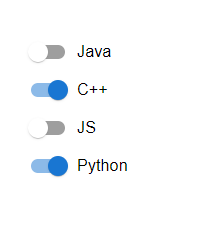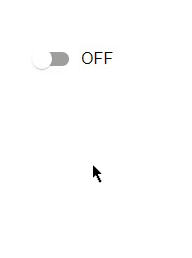如何在 Material UI 中使用表單組建立受控開關?
React MUI 中的開關是一種輸入元素,允許使用者選擇任何一種狀態,通常是開或關狀態。這些通常用於調整移動裝置上的設定。它只是一個檢查型別的按鈕,有助於切換兩種預定義狀態之一。
在本文中,我們將學習如何在 Material UI 中使用表單組建立受控開關。使用 FormGroup 的原因是它提供了一個包裝器,允許對選擇控制組件進行分組,並提供更簡單的 API。
建立受控開關的步驟
以下是使用 Material UI 建立受控開關元件的步驟,以及它們各自的語法:
步驟 1:建立 React 應用程式
在進一步建立滑塊之前,我們必須擁有一個 React 應用程式。要建立一個新的 React 應用程式,請在您的終端中執行以下命令:
npx create react app sliderproject
專案建立完成後,透過執行以下命令導航到其目錄:
cd sliderproject
步驟 2:安裝 Material UI
建立 React 應用程式後,是時候將 Material UI 安裝到 React 應用程式中了。要安裝 MUI,請執行以下命令:
npm install @mui/material @emotion/react @emotion/styled
步驟 3:使用 Switch 定義 FormGroup
現在,讓我們使用表單組匯入和定義開關元件:
<FormGroup>
<FormControlLabel
control={
<Switch
checked={checked}
onChange={handleSwitch}
inputProps={{ 'aria-label': 'controlled-switch' }}
/>
}
label="Controlled Switch 1"
/>
<FormControlLabel
control={
<Switch
checked={checked}
onChange={handleSwitch}
inputProps={{ 'aria-label': 'controlled-switch' }}
/>
}
label="Controlled Switch 2"
/>
…
</FormGroup>
步驟 4:執行專案
要執行 React MUI 應用程式,請在終端中執行以下命令:
npm run start
就是這樣!現在我們已經成功學習了在 MUI 中使用表單組建立受控開關的步驟。
Switch API
<Switch> - 此 API 用於建立開關元件,以便在 React MUI 中開啟或關閉狀態。
屬性
"checked" - 用於指示元件是否應被選中。
"checkedIcon" - 用於指定元件被選中或切換時應顯示的圖示。
"classes" - 允許您自定義或向元件新增樣式。
"color" - 允許您為開關元件選擇顏色。
"defaultChecked" - 當開關不受控時設定預設值。
"disabled" - 停用開關元件,阻止使用者互動。
"disableRipple" - 關閉開關元件中的效果。
"edge" - 在元件的一側新增負邊距。
"icon" - 允許您新增在未選中或未切換時顯示的圖示。
"id" - 為與此開關元件關聯的輸入元素分配 ID 屬性。
"inputProps" - 將屬性應用於此開關的輸入元素。
"inputRef" - 將引用傳遞到此開關內的輸入元素。
"onChange" - 指定一個回撥函式,當此開關的值發生變化時將觸發該函式。
required - 此屬性用於將開關元件定義為必填元素。
size - 此屬性用於更改滑塊的大小。
sx - 此屬性用於在 Material UI 中新增樣式。
value - 此屬性用於向開關新增值。
示例
在此示例中,我們建立了基本的控制開關,這些開關在 FormGroup 元件和 Material UI 中進行了分組。
import React from "react";
import { FormControl, FormControlLabel, FormGroup, Switch } from "@mui/material";
import { useState } from "react";
const App = () => {
const [swt, setSwt] = useState({
java: false,
cpp: true,
javascript: false,
python: true,
});
const handleSwitch = (e) => {
setSwt({
...swt,
[e.target.name]: e.target.checked,
});
};
return (
<div style={{
padding: 40,
width: '50%'
}}>
<FormControl component="fieldset" variant="standard">
<FormGroup>
<FormControlLabel
control={
<Switch
checked={swt.java}
onChange={handleSwitch}
inputProps={{ 'aria-label': 'controlled-switch' }}
name="java"
/>
}
label="Java"
/>
<FormControlLabel
control={
<Switch
checked={swt.cpp}
onChange={handleSwitch}
inputProps={{ 'aria-label': 'controlled-switch' }}
name="cpp"
/>
}
label="C++"
/>
<FormControlLabel
control={
<Switch
checked={swt.javascript}
onChange={handleSwitch}
inputProps={{ 'aria-label': 'controlled-switch' }}
name="javascript"
/>
}
label="JS"
/>
<FormControlLabel
control={
<Switch
checked={swt.python}
onChange={handleSwitch}
inputProps={{ 'aria-label': 'controlled-switch' }}
name="python"
/>
}
label="Python"
/>
</FormGroup>
</FormControl>
</div>
);
};
export default App;
輸出

示例
在此示例中,開關已使用控制狀態建立,並且標籤位於不同的位置。
import React from "react";
import { FormControl, FormControlLabel, FormGroup, Switch } from "@mui/material";
import { useState } from "react";
const App = () => {
const [swt, setSwt] = useState({
java: false,
cpp: true,
javascript: false,
python: true,
});
const handleSwitch = (e) => {
setSwt({
...swt,
[e.target.name]: e.target.checked,
});
};
return (
<div style={{padding: 40,width: '50%'}}>
<FormControl component="fieldset" variant="standard">
<FormGroup>
<FormControlLabel
control={
<Switch
checked={swt.java}
onChange={handleSwitch}
inputProps={{ 'aria-label': 'controlled-switch' }}
name="java"
/>
}
label="Java"
labelPlacement="top"
/>
<FormControlLabel
control={
<Switch
checked={swt.cpp}
onChange={handleSwitch}
inputProps={{ 'aria-label': 'controlled-switch' }}
name="cpp"
/>
}
label="C++"
labelPlacement="right"
/>
<FormControlLabel
control={
<Switch
checked={swt.javascript}
onChange={handleSwitch}
inputProps={{ 'aria-label': 'controlled-switch' }}
name="javascript"
/>
}
label="JS"
labelPlacement="left"
/>
<FormControlLabel
control={
<Switch
checked={swt.python}
onChange={handleSwitch}
inputProps={{ 'aria-label': 'controlled-switch' }}
name="python"
/>
}
label="Python"
labelPlacement="bottom"
/>
</FormGroup>
</FormControl>
</div>
);
};
export default App;
輸出

示例
此示例演示了使用不同大小和顏色的表單組建立控制開關。
import React from "react";
import { FormControl, FormControlLabel, FormGroup, Switch } from "@mui/material";
import { useState } from "react";
const App = () => {
const [swt, setSwt] = useState({
java: false,
cpp: true,
python: true,
});
const handleSwitch = (e) => {
setSwt({
...swt,
[e.target.name]: e.target.checked,
});
};
return (
<div style={{padding: 40,width: '50%'}}>
<FormControl component="fieldset" variant="standard">
<FormGroup>
<FormControlLabel
control={
<Switch
checked={swt.java}
onChange={handleSwitch}
inputProps={{ 'aria-label': 'controlled-switch' }}
name="java"
size="small"
color="info"
/>
}
label="Java"
/>
<FormControlLabel
control={
<Switch
checked={swt.cpp}
onChange={handleSwitch}
inputProps={{ 'aria-label': 'controlled-switch' }}
name="cpp"
size="medium"
color="success"
/>
}
label="C++"
/>
<FormControlLabel
control={
<Switch
checked={swt.python}
onChange={handleSwitch}
inputProps={{ 'aria-label': 'controlled-switch' }}
name="python"
size="large"
color="warning"
/>
}
label="Python"
/>
</FormGroup>
</FormControl>
</div>
);
};
export default App;
輸出

示例
此示例演示瞭如何在 Material UI 中使用表單組建立受控開關。在這裡,我們建立了一個由 React 中的狀態管理控制的開關。現在,當開關切換時,它顯示 ON;否則,它顯示 OFF。
import React from "react";
import { FormControl, FormControlLabel, FormGroup, Switch } from "@mui/material";
import { useState } from "react";
const App = () => {
const [swt, setSwt] = useState(false);
const handleSwitch = (e) => {
setSwt(!swt);
};
return (
<div style={{padding: 40,width: '50%'}}>
<FormControl component="fieldset" variant="standard">
<FormGroup>
<FormControlLabel
control={
<Switch
checked={swt.java}
onChange={handleSwitch}
inputProps={{ 'aria-label': 'controlled-switch' }}
name="Switch"
color={swt ? "success": "default"}
size="medium"
/>
}
label={swt ? "ON" : "OFF"}
/>
</FormGroup>
</FormControl>
</div>
);
};
export default App;
輸出

結論
本文介紹了在 React MUI 中使用表單組建立受控開關的完整過程。本文討論了不同的示例及其各自的輸出。


 資料結構
資料結構 網路
網路 關係型資料庫管理系統
關係型資料庫管理系統 作業系統
作業系統 Java
Java iOS
iOS HTML
HTML CSS
CSS Android
Android Python
Python C 語言程式設計
C 語言程式設計 C++
C++ C#
C# MongoDB
MongoDB MySQL
MySQL Javascript
Javascript PHP
PHP